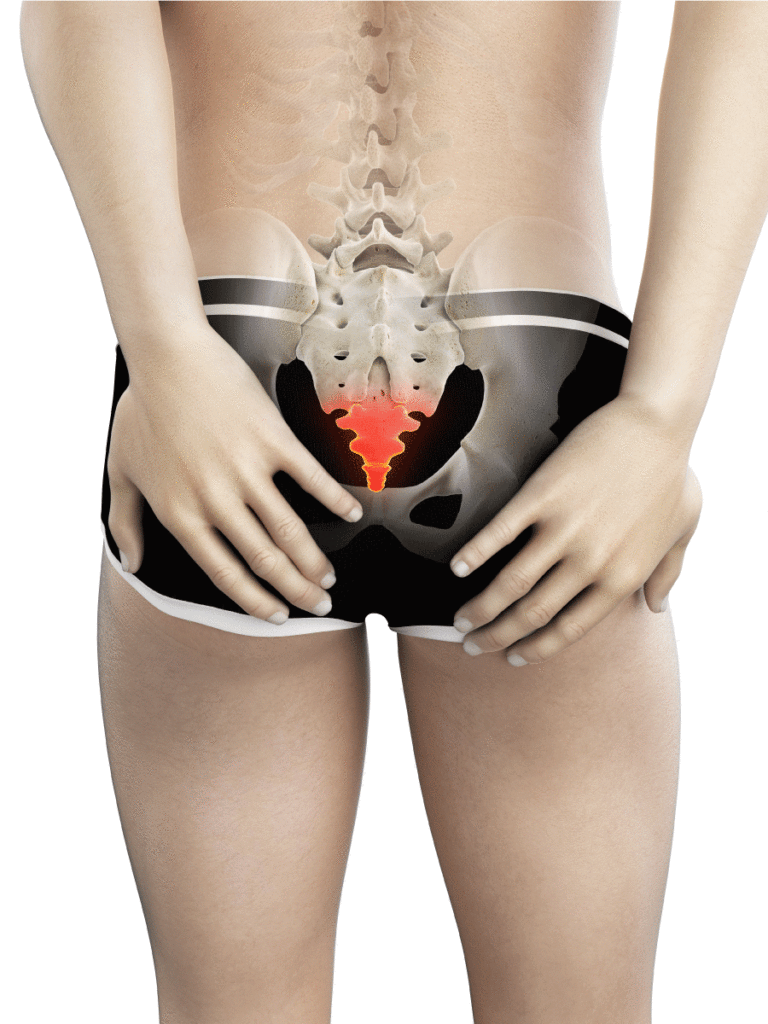
Determining what may be causing your tailbone pain may be an arduous task, yet with the proper steps and medical care, you can better determine what is causing your tailbone pain. In this post, we’ll be discussing how tailbone pain typically comes about in patients, how to temporarily relieve tailbone pain, and why we at Neurosurgery & Spine Consultants are here to help every step of the way.
Why Your Tailbone is So Important
Your tailbone is an area of your body which is crucial for comfortably walking, sitting, or standing. If you have tailbone pain, you’ll certainly know it. Additionally, it provides control and attachment to several surrounding muscles and ligaments in your pelvic area. It supports your pelvis, helps to control bowel movements, and facilitates childbirth in women by naturally moving backward to increase space for the child’s delivery. Your coccyx is extremely important to your bodily functions and helping you function properly.
Possible Causes of Tailbone Pain
Below is a list of possible causes of tailbone pain. While this list is not conclusive, it’s a good starting point to compare and contrast your symptoms against.
Coccyx Bruising, Fracture, or a Dislocation
You’ll most likely notice moderate to severe pain with this symptom, as any type of fracture or dislocation will signal to your pain centers something is not right. One of the best ways to initially determine if this is the case is to have an x-Ray or MRI ordered to see the extent of the injury.
Changes in the Anatomy of Your Coccyx
Over time we all change. Whether this is due to a previous injury, the way we sit or stand, or even how much or how little we exercise. All of these factors, and more, can lead to an anatomical change within your coccyx. It’s important to have yearly, physical evaluations to catch any noticeable changes before they become a bigger issue.
Bone Spurs within Your Coccyx
Just as a bone spur within your foot is extremely painful, a bone spur within your coccyx will be equally painful as well. Bone spurs may occur naturally due to many factors involved, yet they may also occur due to certain injuries or movement patterns over time.
A Coccygeal Arthritis Condition
Arthritis can affect nearly any joint or bone, and the coccyx is no exception. Arthritis within your coccyx may seem unlikely, yet it could be what’s causing your tailbone pain. A physical evaluation would determine just how severe the arthritis is within the area and there will most likely be additional arthritis tests performed to assess if your arthritic condition is elsewhere throughout the body.
A Rare Condition of Coccygeal Infections & Tumors
While this is extremely rare and unlikely, it’s important to rule out anything and everything. When there’s an infection or a tumor, it could end up becoming worse over time. For this reason, it’s important to address anything which may be related to this rare, yet serious associated condition.
Why Sitting is So Painful with a Tailbone Condition
The reason why sitting is typically quite painful with a tailbone condition is due to the fact your tailbone is right where you sit. You may experience even greater pain if you have a profession which requires long hours seated at your desk. Pairing these long hours with a tailbone condition or symptom listed above will only exacerbate the problem.
How to Possibly Relieve Tailbone Pain
Tailbone pain can be resolved when the proper medical care approach is enabled. With our team of experts on staff here at Neurosurgery & Spine Consultants, you can rest assured knowing your tailbone pain will be resolved through our advanced technology and comprehensive care.
Choosing Neurosurgery & Spine Consultants for Your Tailbone Pain
If you’ve been experiencing chronic tailbone pain and have yet to determine what the true cause may be, you’ll want to contact us using the form below. We’ll be sure to respond to your inquiry as soon as possible. We look forward to hearing from you soon and we’re eager to begin treating your tailbone pain efficiently and effectively.
DISCLAIMER: No content on this site, regardless of date, should ever be used as a substitute for direct medical advice from your doctor or other qualified clinician.